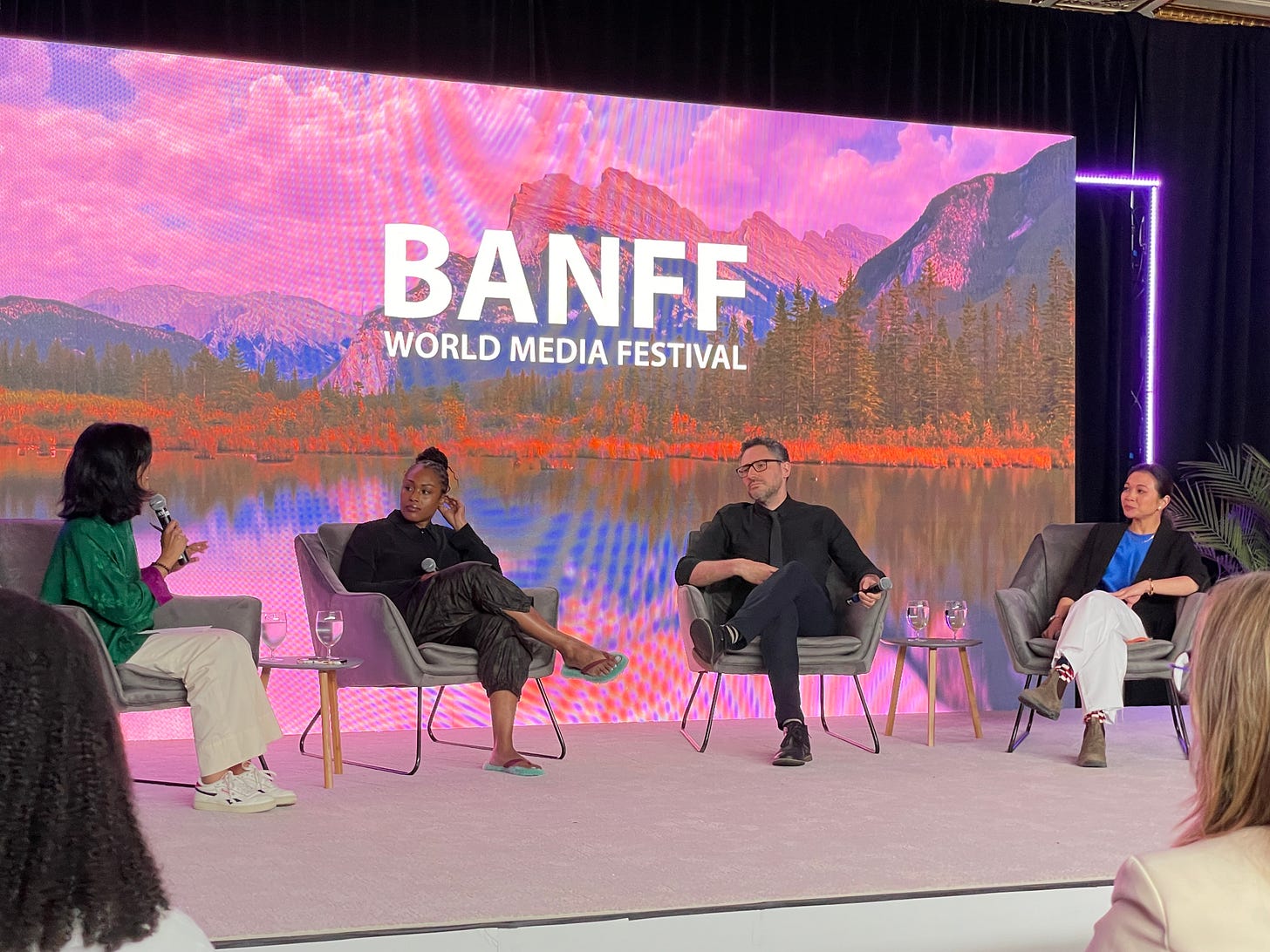Daily Digest: The Banff Onstage Smackdown
Says Adele Lim: 'We should not have to pay for their bad business experiments'

Hello from Canada! I’m at the Banff World Media Festival, having moderated a panel on Sunday with a group of international media leaders, including Amazon Studios’ head of drama series Odetta Watkins and International A+E Networks group managing director Patrick Vien.
Today, the strike was top of mind at the writers panel featuring She-Hulk: Attorney at Law and Swarm scribe Kara Brown, This Is Us’ Elan Mastai and Crazy Rich Asians and Joy Ride’s Adele Lim (who were all given a WGA waiver to speak at Banff). Moderated by Variety’s Manori Ravindran, the chat covered everything from generative AI to the DGA deal to streaming residuals.
During the Q&A, I (as an audience member) had a chance to ask the panelists about the broader structural changes wrought by the streaming economy in recent years — shows being pumped out at a heightened pace, a development and production schedule that prevents writers from getting on-set experience — and to what extent the WGA’s contract proposals addressed them.
Here’s what they had to say:
Kara Brown: I think everyone needs to get a bit of a grip. Why is a pilot costing $10 million? That's silly. Why are you juggling? There's a reason pilot season exists. There's a reason that you shoot the pilot with people you're going to make the show with, and you see if it works, and then you decide if you're going to go make it. One of the sort of threats, it feels like, is [the studios] are like, ‘We're going to make fewer shows.’
Good! Maybe I would rather work for 40 weeks and get residuals — maybe you’re on a show for a few seasons, and then I don't work for a couple years, but I'm floated by that money — than to be in a mini-room every 12 weeks. Everyone does have to get a little bit of grip about what people want to watch, what should be made. And I think it's being, to me, hung over our heads in a way that feels a little like threatening. No — put me in a room for that long so we can learn how to do the job.
I have a friend who’s been on huge shows: she was on Swarm, she wrote on The Bear, she wrote on Yellowjackets. Has never been on set. Never been on set. That's crazy. If you said to her, ‘What if you just worked on one of the shows, and you got to learn how to produce an episode of television, you got to learn how to talk to actors, you got to understand what you're looking for in a pre-production meeting?’ I'm certain she would take that. So I think, obviously, there needs to be a little bit of a reset. But I actually think it's better for all of us.
Adele Lim: The point of our negotiations isn't to solve the structural problems for the entire industry. But you know, like you said, we're kind of the canary in the coal mine. There are huge structural problems, and even prior to describing all this talk of, you know, with the streamers of, Well, because of all these different options, and people don't know where to get a subscription to… we will bundle it together. And we're like, ‘Like cable?!’ And because we're innovators here, we will put on an episode at a time so people don't drop your subscription. So you mean, putting [on] a new episode a week?
Elan Mastai: Like a TV schedule?
Adele Lim: …I think our big point is that we should not have to pay for their bad business experiments and throwing money at the wrong things.
Elan Mastai: Thank you for the Strikegeist emails for free. I subscribe to them. They’re very helpful. Appreciate it.
Look, there's also, there's something fundamental underlying that I've always said, which is like — so I write novels and plays. When I write a novel, I keep the copyright. When I write a play, I keep the copyright. Our predecessors made a deal where we give up copyright. And what we get in return for that is residuals.
That was like a pact that writers made, who gave up this existential thing — the ownership of our labor. And what the streamers did is they broke that pact. Now we went along with it; everybody was excited about the new options. It's not like the writers had historically amazing relationships with traditional studios and broadcasters. Sometimes we do, sometimes that we don't.
But we gave up that fundamental power. And that has been broken. And when the residual formula has been broken, that has to be fixed. Literally the existential foundation of this whole art form that we have all done so well with — and has made so many people wealthy, has entertained people all over the world for decades — has been broken in the last 10 years. And it has to be fixed.
So yeah, there's a lot of business experiments happening right now. Some of them are making a lot of people rich, whether they work or not. We can't solve all of them. We can solve the things that are under our power. And this residual thing more than anything else, to me, has to be fixed. Because it's not just about our livelihood — whether we can afford to, you know, to support our families and our health care — that is like an existential law that’s been broken and we need to get that back on track.
Today in Strike News
In lieu of a script, Tony Awards host Ariana DeBose delivered a searing monologue in support of the WGA last night, exclaiming “Our siblings over at the WGA are currently on strike in pursuit of a fair deal. How many of us know what that is?” (The Wall Street Journal)
Has Hollywood itself finally jumped the shark? The Fonz himself, Henry Winkler, recently commented on the strike, saying “I will say it makes me very sad … Profit is much more important than population, and the individual no longer has status.” (Deadline)
Once again, Daredevil: Born Again has been shut down in New York due to picketers at the Marvel series’ Silvercup East shooting location. (Deadline)
With original local programming as well as content acquired from America, Canadian broadcasters laid out their upfront presentations that were, notably, not very affected by the strike. (Variety)
This Wednesday, screenwriters from across the globe will rally in support of the strike, with events planned in 18 different countries, including Canada, the United Kingdom, Mexico, Israel, and even Ukraine. (Deadline)
Picket Sign of the Day
Tuca & Bertie creator Lisa Hanawalt has entered the chat.

Additional reporting by Matthew Frank






“Everyone does have to get a little bit of grip about what people want to watch, what should be made”
Umm, does She- hulk come into that?